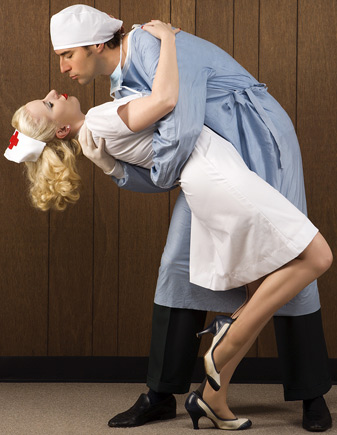1. Attaining all of your capability
2. Why doctors shun candy stripers
3. Is the TV portrayal of ERs accurate?
4. My average day isn't very average
5. How we could innovate our way out of the recession
6. Ridiculing good new ideas—and those who have them
This is part 2 of a wide-ranging discussion; see part 1.
Q: Hey Doc,
Well you do have a point: motivation plays a large role in overcoming fears of being inadequate, or simply incompetent. I can definitely relate to her, because that is exactly the way I feel about my academic ability. People always tell me I'm a rather “bright individual,” but I don't quite believe it myself. Maybe I just have the wrong mindset; do you think that could possibly affect my capability?

A: It could certainly affect the realization, actualization, or fruition of your capability. Consider the doctor I previously mentioned who is now head of a department in a prestigious hospital. Without my encouragement, she would likely still be a lab technician and hating it. I gave her some tips on augmenting brainpower, but the weak link in her chain, so to speak, wasn't brainpower but self-confidence. Without more self-confidence, her brainpower would not have been fully utilized. She would likely be stuck doing what she found boring: repeatedly doing uninteresting technical procedures at the direction of others instead of being the captain of the ship determining where that ship would go and how it would get there.

Q: I really don't think I have any distractions, or interest in any field other than the medical field. Only time will tell I guess, but becoming a doctor is my lifelong dream. I don't think I could ever be content with my life if I don't live up to my expectations.
A: Frittering away one's potential is indeed regrettable. If you think about it, it is easy to appreciate how maximizing your potential benefits society, not just you.
What if Henry Ford remained a watch repairman, farmer, or machinist? What if Ford would have called it quits after the failure of his first auto company, the Detroit Automobile Company, which flopped?
What if Albert Einstein remained a patent clerk?

What if one of my relatives, President Chester Arthur, remained a lawyer? The Civil Service system he instituted is vastly superior to the spoils system that preceded it. Without the Civil Service system, the postal carrier who delivers my mail with care and a beautiful friendly smile might be working elsewhere, with her job being performed by someone else: perhaps a snarly man who cared about doing the right thing as much as the union boss who once stole part of my paychecks and then taunted me, “Whatcha gonna do about it, punk?”
With good reason, people often regret more of what they don't do than do. What if Thomas Edison were satisfied with being a telegraph operator and was on his deathbed in a room illuminated by a candle when an angel whispered into his ear the things he could have done? What if the angel then broadcast that message to the world? Without his 1093 U.S. patents, the world would be a very different place, and we'd surely miss his contributions. Like many innovators, for all that Edison did for himself, he did even more for others.
Q: As for the “arrogant” doctors, I think I might have misperceived their actions. I never came to the conclusion that they might just be rushing off to tend to a patient. Busy Doctor, who would have thought? How selfish of me to think that their worlds revolve around eager candy stripers with questions. I have to admit that next time that a physician flees from me, as if I had some contagious disease, I will definitely consider the fact that they might just want to avoid any workplace mishaps.

A: Amazon sells several candy striper theatre costumes (such as the one in the adjacent photo) that help perpetuate the myth that candy stripers are sex goddesses. Part of this myth is that candy stripers are just candy for the alpha males in hospitals: the doctors. This isn't how real doctors view these valued hospital volunteers, of course, but we are aware of the stereotype that is evidently so common in the minds of others (for reasons I cannot fathom) that anyone seeing a woman in a candy striper theatre costume instantly understands what such outfits connote: sex.
Sex with not just any woman, but nubile beauties too young for any doctor or man who respects the age of consent. Hence it isn't surprising that some doctors treat candy stripers as if they had the bubonic plague before the discovery of antibiotics. A very attractive young candy striper stopped by my home one day, perhaps knowing its location because she volunteered in the ER and I'd hosted the ER Christmas party. What did I do? I introduced her to my younger brother, they married and had four children.
Q: Is the ER really how they portray it on TV or is that just another myth?

A: The current ER/hospital shows are much better than the old-time shows in depicting what really goes on in emergency departments and hospitals, but they have far to go to tell the whole story. In my books and websites, I've discussed some of what they omitted. I think it is important for the public to have a better understanding of what goes on because they have a right to know, for example, why the United States is going broke by paying for “healthcare” that has nothing to do with health or medicine. This problem is so common that ER personnel have a name for it: bullshit.
I've seen my share of ER bullshit cases, such as perfectly healthy men strolling into the emergency department thinking I'd assuage their libidinal desires by setting them up with a nurse, who they viewed as sex maniacs. One fellow reached this conclusion after watching a pornographic film, Night Shift Nurses.
If you think that's bizarre and a flagrant waste of money, consider the patient I had who called 911 and came to the ER by ambulance because she was dying to know if her vagina was too loose!
If you consider all of the ER bullshit I've seen (some of which is in my ER books, with some as-yet unpublished on my hard drive, waiting for a day when I have more free time), and you realize the CYA that doctors must often resort to when confronted with such BS, you can do the math and conclude that the United States has needlessly wasted a boatload of money.
Q: Wow, your average day doesn't seem so “average.”
A: It's even more interesting that what you likely imagine based on what I wrote in part one of this discussion. I've been interviewed by many newspapers, TV, and radio stations. A Discovery Channel producer who read my first book (Fascinating Health Secrets) told me, “Dr. Pezzi, there are thousands of books on health, but no one writes like you.” He asked me to co-host a show (to be called Healthy Alternatives) along with the requisite beautiful woman, who would pose questions as we were seated in a set made to look like an old-fashioned diner. That show never got off the ground because the producer's wife persuaded him to move to Hawaii, so he said he instead planned to do a travel show.
I've had other offers, including one from a man behind one of the biggest Hollywood blockbusters of all time, who wanted to turn some of my ER stories into a movie or new TV series. Alas, that offer came around the time of my Mom's death, so I did not evince the interest he deserved and likely expected.
Several weeks ago, a movie producer/director I'd never heard of asked me to appear in a film discussing some of my unusual ER cases; I agreed to do that only if he used his Hollywood connections to quickly help a deported person from my area reenter the U.S. (I am selling my Sea-doo, Ski-doo, and shed to help her). I would otherwise decline his offer because I am too busy creating a system that I believe is the missing link in the perennially vexing question of how to make healthcare affordable without rationing: by obviating the need for much of it by giving people an easy—even addictively fun—way to become healthier, happier, more energetic, smarter, more creative, and even better looking, to boot.
When I need a mental break from that project, I love to dig deep into physics. I've succeeded in doing what others would deem impossible: inventing a way to uncouple mass from the force it exerts in a standard gravitational system here on Earth (not in outer space far from the grip of gravity). And that's just the tip of one very interesting iceberg.
Q: It seems as if you could make a whole soap opera on your life! BTW do you have an autobiography or something by any chance? I have to learn more about you.
A: If I can invent a practical device that exploits my method of uncoupling mass from the force it exerts, there will surely be enough people wanting to read about me to make that book worthwhile to write. Until then, you can read about me in my websites and books (I'll give them free to you, if you'd like); I've mentioned some of my past in those sources.
I think the most interesting thing about me, and the thing that could benefit others the most, is the story of how I went from dunce to doctor: from a struggling student so discouraged by the difficulty of learning that my big dream in life once was to drop out of high school, work on the assembly line for a Big Three auto manufacturer, and keep lifting weights until I became the world wristwrestling champion—my sole gift at that time, other than eating large piles of Christmas cookies.
If just 1% of U.S. citizens could replicate my metamorphosis of brainpower that did even more for my creativity than scholastic performance, we could easily innovate our way out of the current economic slump. One could point to myriad reasons why our economy is stumbling, but one factor is that the United States, once home to most of the Big Ideas that changed the world, is now flooded with lots of little ideas that, even collectively, don't amount to much more than a hill of beans. For example, I can now record video on a disk instead of a VCR; does that improve my life? Not one iota! In fact, digital video recorders, like many supposed advances, are a giant step backwards in many respects. Most of what passes for advances these days are little more than clever ways of entertaining people while they rob them of their free time that could be used to strengthen their connections with people in the real world or even to dream up The Next Big Thing that would help others instead of sapping their potential.
We need inventions that will truly change the world, making life easier and more enjoyable while saving us time and money, such as giving us an entirely new way to do something that is more essential than healthcare. My close-minded skeptics will be eating crow, just as others who clung to the past. They ridiculed innovators who we now recognize as forward-thinking sages, while their skeptics were proven to be laughably wrong. As I mentioned in another article, great new ideas are usually derided, not praised, by intellectual lightweights bereft of imagination who went from laughing at the innovators to having others laugh at them in perpetuity.
An advertising slogan created for Apple Computer in 1997 brilliantly explained how “the round pegs in the square holes, the ones who see things differently” who are “crazy enough to think they can change the world, are the ones who do.”
“Ridicule is the tribute paid to the genius by the mediocrities.”
— Oscar Wilde
“When a true genius appears in this world, you may know him by this sign, that the dunces are all in confederacy against him.”
— Jonathan Swift
“The future belongs to those who consistently search for room to improve while others exhaust their opportunities by railing against change.”
— PJ Wade
“Only those who attempt the absurd will achieve the impossible.”
— M. C. Escher
“A man with a new idea is a crank—until the idea succeeds.”
— Mark Twain
“Great spirits have always encountered violent opposition from mediocre minds.”
— Albert Einstein
Q: Thank you again for taking my questions into consideration; it really says a lot about your dedication and passion for helping people. I'm sure you get this often but just in case you don't: I think you are mesmerizing, and have me awestruck with your talent. You are definitely an inspiration to me, so in about 13–14 years when I become a doctor, if it's God's will, you will totally be at the top of my thank-you list.
A: Thank you so much for your kind words! You made my day! :-)
Back to the main Question & Answer page
